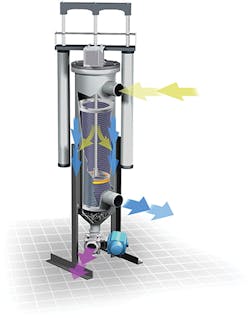Filters Curb Water Consumption, Feed Sustainability
About the author: Margaret DeAngelis is communications manager for Eaton. DeAngelis can be reached at [email protected] or 732.212.4703.
The state of California was having a beef with a major meat packing company regarding the amount of water it was using.
Perhaps more so than in any other area of the U.S., water is the lifeblood for social and economic well-being in this essentially arid state.
Because of that, numerous legislative initiatives have been implemented over the years to better conserve water, covering everything from the installation of more efficient sprinklers and the planting of drought-tolerant landscaping to the upgrading of some 10 million public and private toilets.
Seeking Efficient Solutions
Faced with the need to do its part to help curb water usage, the meat packing company sought recommendations from Eaton’s filtration business on how to more efficiently reuse and recycle water at one of its facilities in central California.
Engineers at the company and Eaton representatives eventually identified one area of the processing—known as a hide-on wash station—in which water usage was especially high. Recycling the rinse water from the hide-on stations, they concluded, would significantly reduce consumption.
Recycling the rinse water, however, required an especially robust filtration system, due to the extremely harsh operating conditions that exist at a hide-on station, where filters must deal with high quantities of dirt, hair, fat and other impurities. High flow rates further complicated the task.
The problem soon was solved with the installation of three DCF-1600 filters with twin pneumatic actuators.
“Eaton’s filtration team is regularly requested to make recommendations based upon actual site visits to view firsthand the conditions of processes,” said Richard Barreto, strategic accounts manager for Eaton’s Filtration Div. “Based upon what we witness and given the breadth of the filtration product line, we can usually determine which product will operate successfully in even the most severe environments.”
Ideal for a variety of food processing applications, the filters were designed for the rigors of processing highly viscous, abrasive and sticky substances. The filters, which operate at low differential pressure, easily accommodate a range of flow and retention requirements.
Additional features include:
- Elimination or reduction of disposable filter bags and cartridges for reduced operator handling, inventory costs and landfill waste;
- Reduction in product loss and more thorough containment purge in a highly concentrated waste stream;
- Reduction or elimination of operator intervention for safer operations;
- Virtually maintenance-free operations with almost 100% uptime;
- Compact design and lower capital cost to fit most installations; and
- Stainless steel screens ranging from 15-µ slots to ¼-in. perforations to handle a range of filtration needs.
The dual actuators on the filters isolate the actuation mechanism from the filtrate with a bridged system, resulting in a long operating life in nearly any condition.
Future-Proof
Due to its water conservation efforts, the meat packing company also should be set if future restrictions develop for incoming water, which has occurred in California in the past, due to ongoing water shortages. Meanwhile, discharged wastewater has been effectively minimized with the use of recycled water.
Visitors from the company’s sister facilities have observed the filters operating in California and will investigate ordering their own installations.
“Water recycling and reuse is a huge challenge in the food processing industry and one that is ongoing,” Barreto said. “With the right filtration systems in place, there are many areas where water can be filtered, including incoming water from wells, as well as water used in wash stations, cooling towers, storage tank cleaning and countless other applications.”
Disposal of less wastewater also brings about important benefits to the environment and helps companies reach their sustainability goals.
Download: Here
